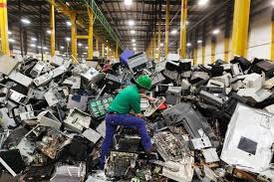A staggering 471 million small electronic gadgets like charging cables, LED lights, mini fans, and single-use vape pens were discarded last year, according to a study by Material Focus. These “Fast Tech” products, akin to the fast fashion industry, represent the fastest growing segment of electronic waste.
It’s not just about waste; the average household reportedly has around 30 idle electronics gathering dust. Yet these items harbor precious raw materials that are ripe for recycling.
Material Focus, a non-profit organization, obtained these insights from a survey conducted by Opinium Research, which involved 2,000 participants. The data reveals that the UK alone tossed out:
- 260 million disposable vape pens
- 30 million assorted lights
- 26 million cables
- 10 million USB drives
- 7 million wireless earbuds
- 5 million mini fans
With an average price tag of just £4, it’s easy for consumers to regard these items as throwaways—even if they are not engineered to be disposable. However, these gadgets contain valuable components like copper and lithium batteries that can be reclaimed through proper recycling.
Scott Butler, the Executive Director of Material Focus, emphasized, “Consumers often discard these items without recognizing their intrinsic value. Our mission is to inform people that anything with a plug, battery, or cable can—and should—be recycled.”
Globally, the scenario is no different. A staggering 9 billion kilograms of cables, toys, vapes, and other novelty items are disposed of annually, often not even identified as e-waste, says a report by the Waste Electrical and Electronic Equipment Forum.
On a positive note, Material Focus’s study indicates that electrical waste has actually been decreasing since 2017. This reduction is attributed to both lighter electronics and improved recycling practices; now, 60% of people claim to recycle their electronic items.
Nevertheless, Nadiya Catel-Arutyunova, a sustainability adviser at the British Retail Consortium, reminds us that “Retailers selling electronics are obligated to assist customers in the responsible disposal of their old electronic goods, irrespective of where they were initially bought.”
It’s time we view our e-waste differently. These aren’t just disposable items; they’re resources waiting to be reused.
